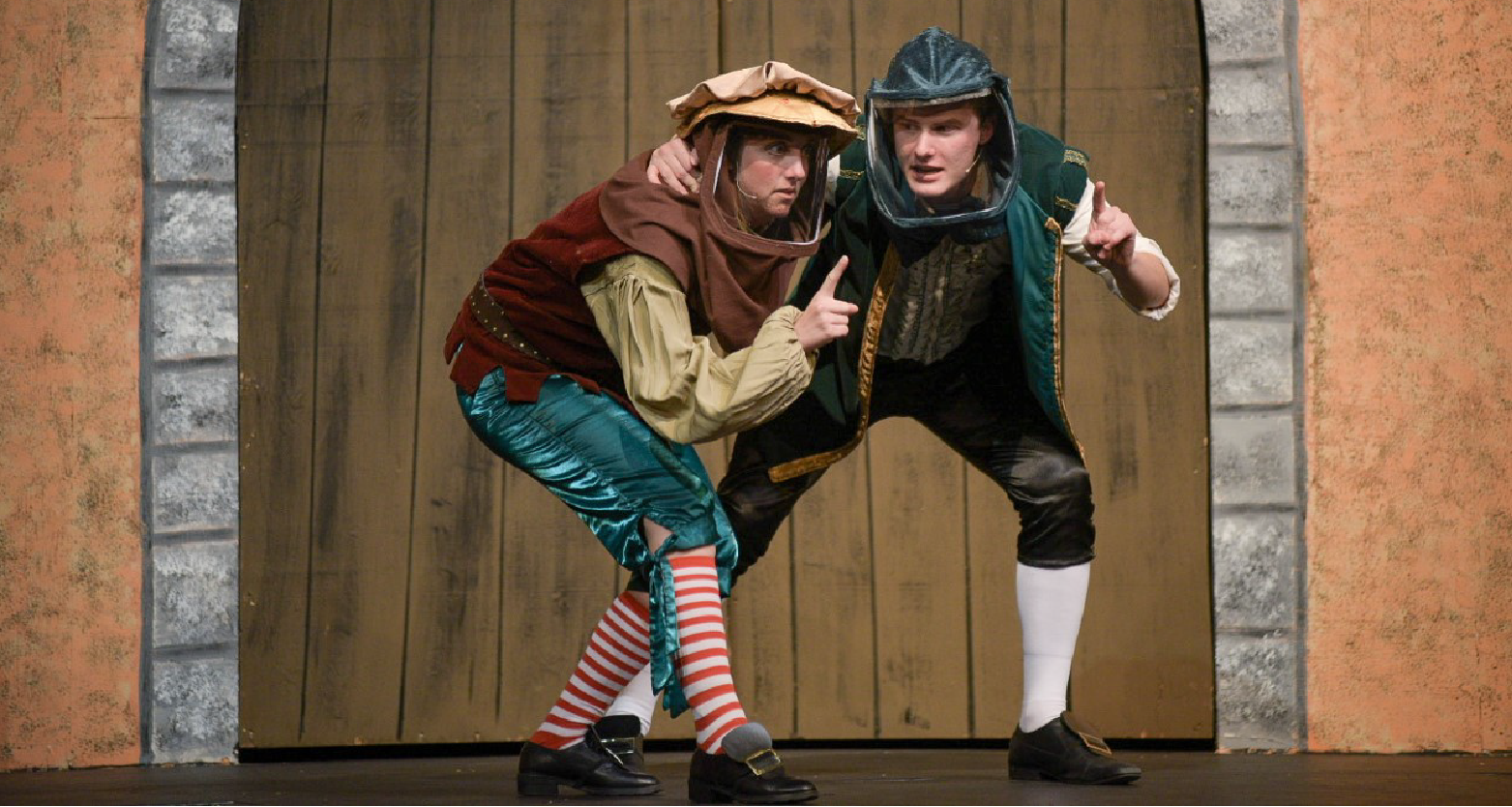“The Comedy of Errors” Unleashes the Power of Creativity in Overcoming Obstacles

“I to the world am like a drop of water/ That in the ocean seeks another drop.”
This line, spoken by Antipholus of Syracuse, one of the play’s focal twins, might resonate with audiences in this year as much as in any year since the first staging of Shakespeare’s The Comedy of Errors in 1594. This has been an uncommon season, marked as much by the presence of noteworthy events as it is by their absence. Isolation, loneliness, and loss have split communities like the stormy seas of the comedy’s opening act.
Among the list of things we have been forced to abandon, the arts hold prominence in the hearts and minds of many. And yet, Corban’s Theatre Department has found a way to put on a show.
At first glance, The Comedy of Errors seems like a simple and light-hearted choice with its farcical antics and unbelievable coincidences─a silly reprieve from a dark and heavy time. But as the narrative is driven forward, or rather, unravels before the viewer’s eyes in a tangled shamble of mistaken identities, a deeper purpose is realized.
At the heart of this bold and daring attempt at one of Shakespeare’s more ludicrous comedies beats the ancient, galvanizing theme of order rising from the seas of chaos. At the end of the play, all is clarified. A community discards antagonism for harmony, families are reunited, and loving bonds are formed and reforged. This is a tale for our time.
Few things make this more apparent than the peculiar attire of the players. Shakespearean from toes to shoulders, each performer’s head is shrouded by a wide medical face shield, covered by a cumbersome hood. The result of this post-apocalyptic meets early-modern costuming strikes somewhere between clown and contagion. And yet, this does not feel like a distraction, rather a faithful portrayal of our time. This is exactly the world we have been living in.
I believe play director Tamara McGinnis’s choice of period staging and costuming, in spite of the highly visible difficulties, to be intentional. It signals an imaginative and unapologetic approach to the practicalities of the return of drama post-pandemic. No attempt is made in early dialogue to explain these accommodations, and there is none needed. These hoods are a mirror of the challenges we face in daily life. They prominently resemble what is felt as our shared “new norm.” As a result, the hoods, which would be considered goofy and unwieldy in any other year, read more as art than obstruction─symbols of unbridled resourcefulness, creativity, and resilience.
The quality of the performance itself quickly puts them out of mind. The audience is left to instantly identify with the chronic confusions of the twin brothers, Antipholus of Syracuse and Antipholus of Ephesus, played by Brendan Fugere and Wesley Brewer, while their clowning twin servants, Dromio of Syracuse and Dromio of Ephesus (Victoria Venard and Elisa Wright) redress these frustrations in carefree comedy, allowing the audience an escape from the similarly chaotic pressures of daily life. The exuberant interactions of the four manage to deftly drive the plot further toward madness without losing the audience in their convoluted episodes of mistaken identity.
Nicole Peeke and Faith Treadwell offer a steadying counterpoint to this madness, as their portrayals of sisters Adriana and Luciana add moments of sensibility to the collection of odd characters. Both actresses comically characterize the plight of the early-modern woman of Shakespeare’s day, subtly highlighting the playwright’s playful subversion of the male twins’ dramatic, emotional, and irrational antics.
The sum total of the quirky cast and their unusual attire makes for multiple levels of fun free from triviality, and philosophy unburdened by heavy drama. The audience is left with the space to laugh through the absurdity of the plot, while also pondering the new relevance of its concluding message.
Is the play itself largely absurd? Of course. Do the actors’ hooded face shields cultivate a genre cross between the renaissance stage and a biohazard movie? Undoubtedly. But this production strikes at the heart of our thirst for community. And the sacrifices of the cast and crew, their courage and creativity in safely reimagining theatre for the post-pandemic stage, resonate as much as the obvious talent behind their performance. Despite overwhelming difficulty, they have alighted on something just short of magical─an alchemy of creativity, transforming substandard circumstances into a must-see performance by any year’s standard.
Whether attending in person, or viewing virtually, when the curtains draw, you’ll find yourself refreshed, moving ever closer to the day when chaos is replaced by order, all is made right, and a community divided is fully reunited. In that day, hearts will echo the closing lines of the play’s chorus: “In gratitude we come together and chase away our fears forever.”
Corban Theatre’s production of “The Comedy of Errors” is available to view through Sunday, November 15, with both streaming and limited in-person viewing options available. Purchase your tickets today at https://www.onthestage.com/show/corban-university/the-comedy-of-errors-40686.









